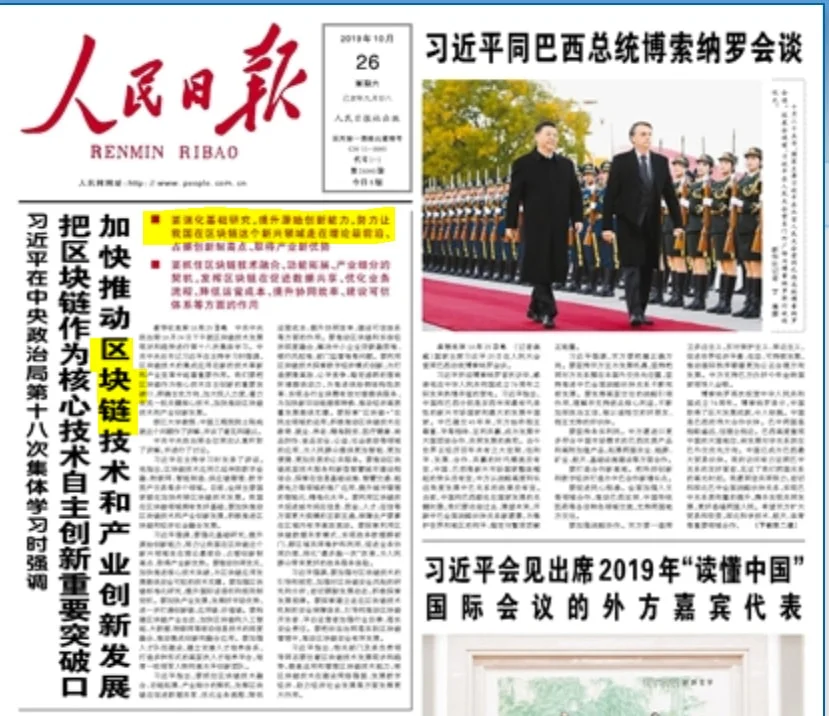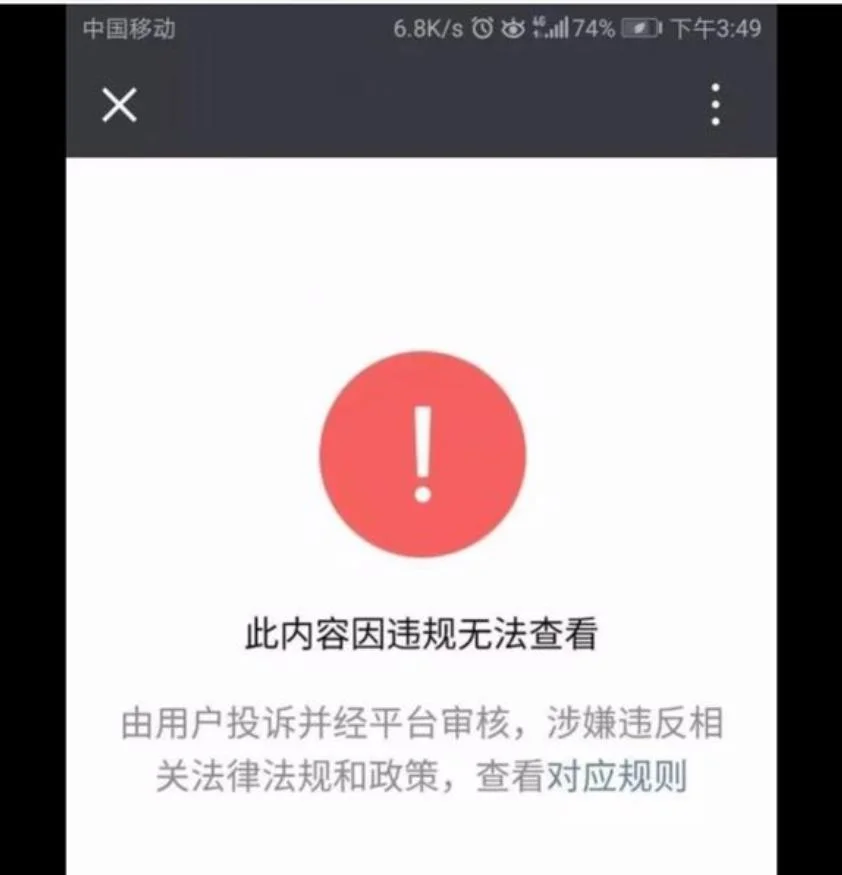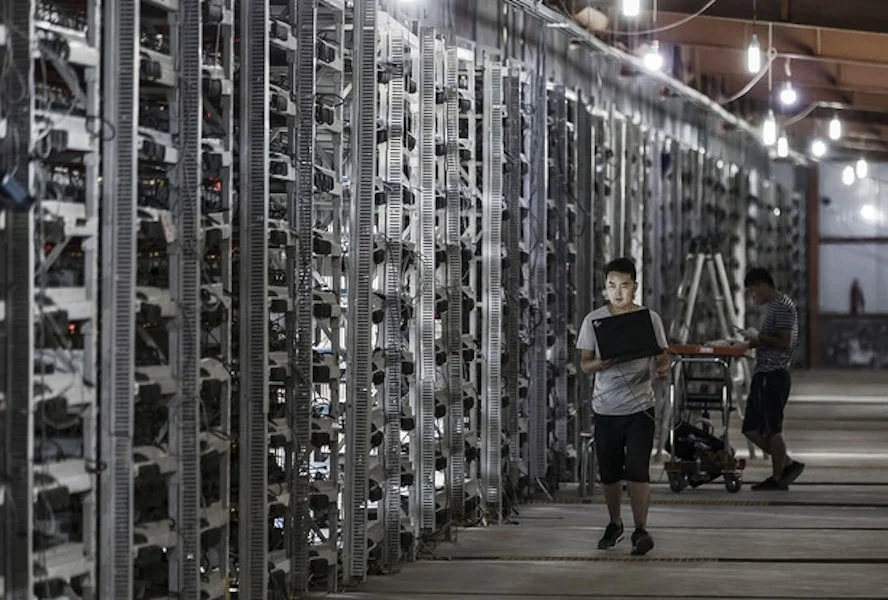China’s Blockchain Initiative
China has start a country wide initiative to rapidly adopt Blockchain Technology and ‘urgently’ develop use cases. China’s President Xi Jinping personally appealed for a greater urgency to develop blockchain in-front of the Communist Party of China Central Committee. This sentiment was echoed in by state media People’s Daily published a front page article on “Placing Blockchain as one of the countries core initiatives, with a target on key breakthroughs“. On top of this, national TV station CCTV-2 had various news segments dedicated to discussion blockchain technology – with a key emphasis that Blockchain, not Bitcoin is China’s key focus.

This huge initiative to push Blockchain is clearly related to the launch of China’s National Digital Currency – “DCEP” (Digitial Currency / Electronic Payment). This new currency is issued by the People’s Bank of China (PBoC), and will act as both a replacement for Researve Money (M0) and as a digital cash. DCEP will initially be rolled out to banks affiliated with PBoC and eventually to the general public via Tencent and Alibaba.
It is important to point out the DCEP will be a centralized & private blockchain. New currency on the network will be issued by the PBoC via authority from the Chinese Government. There will be no public participation in the network, unlike the decentralized Bitcoin network which uses Blockchain to form an open public consensus.
Blockchain, Not Bitcoin
One of the key areas of contention in the cryptocurrency space is whether a private or centralized Blockchains have value.
- Opinion 1: Bitcoin, not Blockchain
- Opinion 2: Blockchain, not Bitcoin
Proponents of Bitcoin argue that Blockchain’s key value is that it allows for a decentralized network, a leaderless network where anyone can join, participate and verify transactions. The argument is that if the purpose of a Blockchain is record transactions like a database, centralized databases like MySQL or MongolDB will have higher efficiency than Blockchain. Thus, it would only make sense to use Blockchain when there is a need for public open consensus. Following this argument, cryptocurrencies like Bitcoin and Ethereum are neccessary for a Blockchain to function, as they play an intrinsic role in rewarding good actors on the network.
Proponents of Blockchain argue that the Blockchain offers security and transparency, giving it a distinct advantage over traditional databases. China takes this argument one step further and actively discourages the use of cryptocurrencies and trading in cryptocurrencies (eg. Cryptocurrency exchanges are banned in China).
Government condones “Air Coins” and Cryptocurrency Speculation
State media People’s Daily have explicitly condoned cryptocurrency speculation and brought accusations against “air currency”. Air Currency, or air coins, is a chinese colloquial term used for cryptocurrencies that have no intrinsic value, very much like air. This move is designed to counter-act the surge in rushed venture capital investments into different cryptocurrencies in China, many of which don’t have a real use-case. In addition, the article explicitly called for illegal transactions and money laundering to be rectified, suggesting further enforcement actions against none state regulated cryptocurrencies. This heavy enforcement can be seen as a “stick” measure to push users away from decentralized cryptocurrencies into the centralized national currency, DCEP.
“Blockchain is a Scam” is Censored by Social Media

Experiments done by @cn_Ledger and other Chinese media sources have found that articles calling Blockchain a “scam” are actively being censored in China. Anyone posting these articles will find that they are quickly deleted and may face potential account suspensions. This type of media content control is standard in China once the Central Party issues a particular doctrine. Media platforms are quick to comply, or they will risk the removal of their ICP license.
Cryptocurrency Mining is no longer “Banned” in China

The Chinese Government is no longer pushing for the elimination of cryptocurrency mining (such as Bitcoin and Ethereum mining). This is a complete 180° reversal of government policy will take effect on 1 Jan 2020, meaning mining will a legal and taxable industry in China. Previously “Cryptocurrency Mining” was part of a list of industries to be eliminated. This change comes directly from the new edition of China’s Industrial Structure Adjustment Guidance Catalog, where an updated revision no longer mentions cryptocurrency mining as an industry to be phased out.
Traditionally China has always played a major role in Bitcoin, Ethereum, Litecoin and DASH mining. This is mainly due to the abundant supply of cheap electricity in China (especially in the Sichuan and Mongolian regions), where electricity costs can go as low was $0.02 USD per kw/h. To find more about Bitcoin mining, check out our full Bitcoin mining guide.
Overall this policy reversal sends strong positive signals about cryptocurrencies in China. This is a clear indicator that the Chinese Government recognizes the importance of mining and it’s role in decentralized public Blockchains. Such policy changes suggest a positive future where other policies halting cryptocurrency development could be reversed.
Cryptocurrency trading is still banned
China has banned cryptocurrency trading since 2017. The government has taken down chinese operation of big fiat exchanges such as OKex, Huobi and BTChina. Chinese exchanges no longer have fiat bank accounts. As users move to peer to peer trading. Alipay has made it clear that it will not tolerate crypto trading on it’s platform.
What about Chinese Blockchain projects like Vechain and NEO
Whilst China’s Blockchain Initiative explicitly discourages the speculation in cryptocurrencies – Blockchain projects are thriving in China. This is a Cryptocurrency is a core part of Blockchain – Satoshi Nakamoto created Bitcoin and Blockchain together in his 2009 white paper. So whilst the Publications by the central government tries the downplay cryptocurrency speculation, every public cryptocurrency network must have an associated platform token.
Having the Blockchain initiative being pushed forward will greatly help the adoption of projects like Vechain in China. At the end of the day, the government validated the value proposition of Blockchain, answering many skeptics who are critical of Blockchain’s real life use case.

Michael Gu
Michael Gu, Creator of Boxmining, stared in the Blockchain space as a Bitcoin miner in 2012. Something he immediately noticed was that accurate information is hard to come by in this space. He started Boxmining in 2017 mainly as a passion project, to educate people on digital assets and share his experiences. Being based in Asia, Michael also found a huge discrepancy between digital asset trends and knowledge gap in the West and China.
